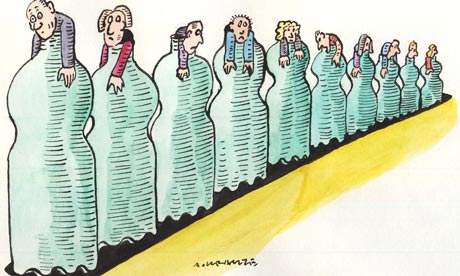OK, this mug's got my name on it – but that doesn't mean Starbucks cares

‘Somewhere between Margaret Thatcher and the fall of Lehman Brothers, there were signs of half-decent customer service.' Illustration by Andrzej Krauze
'A Coke is a Coke and no amount of money can get you a better Coke than the one the bum on the corner is drinking," said Andy Warhol. "All the Cokes are the same and all the Cokes are good."
Such was the capitalism that was embodied not just by Coca-Cola, but the Ford Motor Company – and named, towards the end of its dominance, "Fordism". Now, though, we are said to like our transactions personalised and touchy feely. Ergo a summer-long promotion titled "Share a Coke", whereby the usual logo has been replaced by 150 first names – from Aaron to Zoe, via Faisal, Josh, Lauren and Saima. That all this rather cuts across the imperious yet egalitarian brand that Warhol so loved does not seem to have occurred to anyone; nor, apparently, has the whole idea's air of awful tweeness (while writing this, I bought my obligatory "John" bottle from Marks & Spencer, and remained unmoved).
At Starbucks, meanwhile, they now insist that your hot caffeine also comes emblazoned with your name – written on a sticker, to be hollered by a barista. This scheme arrived in early 2012, in a similar flurry of faux-enlightened PR: "Have you noticed how everything seems a little impersonal nowadays?" ran the promotional text.
Unlike the Coke wheeze, though, it was also a see-through attempt at damage limitation: six months later, the company's byzantine tax arrangements would be under intense scrutiny. But in the ordinary world, Starbucks was already becoming a byword for sloppiness and mess, not to mention coffee that tastes like the hot milk my nan used to make me circa 1973. As a former 'Bucks addict, my own epiphany came in their branch in Birmingham's Bullring Centre, where the tables were piled high with dirty cups and plates, only two staff seemed to be on duty – and if the place had been an independent business, you would have taken one look and assumed it was rightly headed for the knacker's yard.
Yet Starbucks is still here, making handsome worldwide profits. Yes, after a major reputational wobble, it has nobly offered to throw £20m over two years at Her Majesty's Revenue & Customs. Hosanna! They now shout your name when they hand you your cup of warm milk and a plywood panini. But going to any of its outlets remains a dependably joyless experience, suggestive of something remarkable: the company is not so much too big to fail, as too big to really care. Once enough competitors are out of the way, it seems, modern branding can work magic: providing you avoid killing anyone, that enough people will carry on trudging through your doors, whatever happens
My own recent experience of sclerotic, unresponsive, mind-bogglingly awful treatment runs from Virgin Media (hours waiting on "helplines", which reached an acme of annoyance when I was offered a choice of what music would be played down the phone – by genre), through the train giant First Great Western (frequently late, insane ticket prices) and on to such behemoths as McDonald's (vast queues) and PC World (don't get me started). When it comes to the ubiquitous Amazon, there are once again lines to be drawn from its tax arrangements, through standards of service – I have long given up on its "next day" delivery option – to its predatory behaviour, last seen when it hiked up its fees to independent "marketplace" sellers by up to 70%.
Running through a lot of this, I would imagine, is much the same business model: workforces hacked down to the bare minimum and poorly paid, the apparent belief that if you track your customer's buys via data accumulation and give them what you think they want, more quaint ideas of customer service can be dumped, fast.
To all this, there is an obvious enough response: hasn't a mixture of flimsy "personalisation" and arrogant business–as-usual always been the capitalist way? Perhaps. But somewhere between the arrival of Margaret Thatcher and the fall of Lehman Brothers, there were at least fleeting signs of an embrace of half-decent customer service – as proved by plenty of businesses, not least the big British supermarkets.
Bear with me, please. Though I cannot quite date them, I have clear memories of visiting Tesco, Asda and Sainsbury's, and realising that though they were strangling independent competitors, squeezing producers and offering an illusion of choice under which lay a remarkably Fordist way of operating, their customer service was actually very good. You may recall the dedicated bag-packers, or the staff's breezy openness to being sent to scour the aisles when you reached the checkout and realised you'd forgotten the broccoli .
More often than not, my own supermarket shopping now ends with an exasperated glimpse of gridlocked checkouts, and the usual trudge through the self-service terminals sometimes known as "the fast lane": a con trick that would have caused Marx and Engels to hoot with mirth, whereby the customer now doubles as the worker. I contacted Sainsbury's, Asda and Tesco to ask how many were now in operation, and what the increasing dominance of fast lanes meant. Their replies were uniformly evasive, and the one from Tesco was particularly grim: "We believe in giving our customers choice. Over a third of shoppers choose to use self-service tills, not least because they find them quicker and more convenient. For customers who need assistance, there is always a member of staff on hand." Somewhere in those words is the same arrogance you can taste in your average grande skinny cappuccino and granola bar.
There is, then, a new model of business, which rather puts me in mind of words uttered not by Andy Warhol but the market traders of the West Midlands. "Never make a mug of your punter," they used to say. But that is what modern business does. And strangest of all, contrary to all that stuff about consumer sovereignty, it seems to be not just getting away with it, but prospering.





